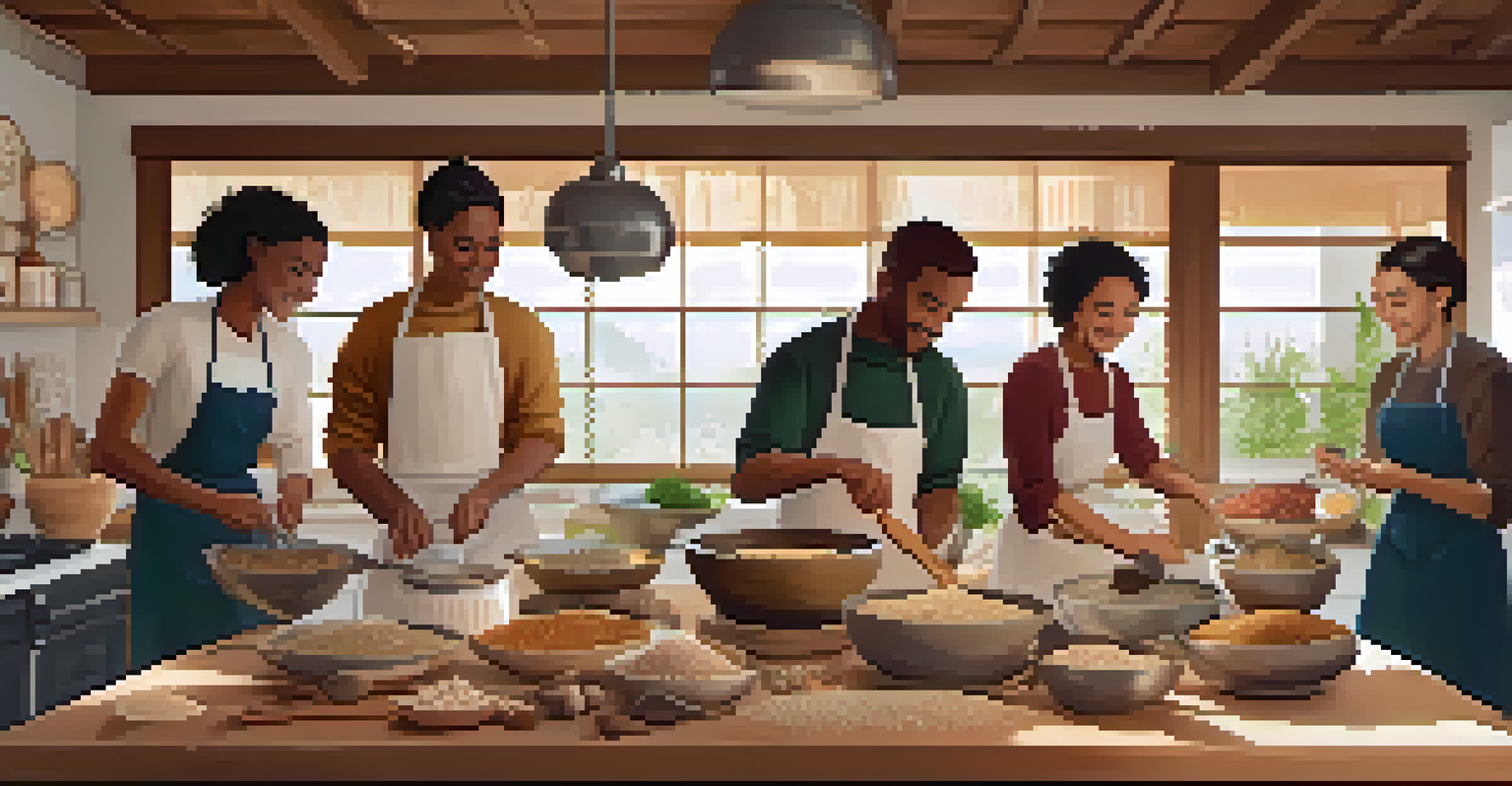Integrating Culinary Skills into Nutrition Counseling

Understanding the Role of Culinary Skills in Nutrition
Culinary skills play a pivotal role in nutrition counseling by bridging the gap between theory and practice. When clients understand how to prepare healthy meals, they are more likely to adhere to dietary recommendations. This practical approach empowers individuals to make informed food choices that align with their health goals.
Cooking is like love. It should be entered into with abandon or not at all.
For instance, a nutritionist can guide clients in meal planning and cooking techniques that emphasize whole foods. By teaching skills such as chopping vegetables or cooking grains, clients gain confidence in their ability to create nutritious meals. This hands-on experience transforms abstract nutritional concepts into tangible actions.
Ultimately, integrating culinary skills into nutrition counseling fosters a holistic approach to health. Clients don’t just learn what to eat; they also learn how to prepare it, making healthy eating a sustainable lifestyle choice.
Enhancing Client Engagement Through Cooking Demonstrations
Cooking demonstrations are an engaging way to bring nutrition concepts to life. By showing clients how to prepare simple, healthy dishes, dietitians can spark interest and excitement around food. This interactive format encourages participation and helps clients see the joy in cooking nutritious meals.

For example, a nutrition counselor might host a workshop where clients learn to make a balanced salad or a hearty soup. During the demonstration, the counselor can discuss the health benefits of each ingredient, reinforcing the nutritional message. This hands-on experience allows clients to ask questions and share their thoughts, creating a dynamic learning environment.
Culinary Skills Enhance Nutrition
Integrating culinary skills into nutrition counseling empowers clients to make informed food choices and adhere to dietary recommendations.
Moreover, cooking demonstrations can foster a sense of community among participants. Clients can connect with each other over shared experiences, which can enhance motivation and accountability in their health journeys.
Building Confidence in Meal Preparation Skills
One of the key benefits of integrating culinary skills into nutrition counseling is the boost in confidence it provides clients. Many individuals feel intimidated by cooking and may shy away from trying new recipes or ingredients. By breaking cooking down into manageable steps, nutritionists can help clients overcome these barriers.
Tell me what you eat, and I will tell you what you are.
Imagine a client who has never cooked quinoa before. By guiding them through the cooking process, from rinsing the grains to fluffing them with a fork, the dietitian can demystify the experience. This empowerment not only builds confidence in the kitchen but also encourages clients to experiment with other healthy foods.
As clients gain confidence, they are more likely to try new recipes and incorporate a variety of foods into their diet. This adventurous spirit can lead to improved nutrition and overall health, as clients discover new flavors and cooking methods.
Addressing Cultural Preferences in Culinary Counseling
Understanding and respecting cultural food preferences is essential for effective nutrition counseling. Every culture has its unique culinary traditions, and integrating these into nutrition advice can lead to more personalized and effective guidance. By acknowledging clients' backgrounds, nutritionists can tailor their recommendations to fit their lifestyles.
For instance, a nutritionist working with a client from a Mediterranean background might incorporate traditional ingredients like olive oil, legumes, and fresh vegetables into meal plans. By using familiar foods, clients may feel more connected to their dietary changes, increasing the likelihood of success.
Cooking Demonstrations Boost Engagement
Cooking demonstrations make nutrition concepts tangible and enjoyable, encouraging client participation and fostering a sense of community.
Moreover, discussing cultural food practices can open up conversations about health and nutrition in a meaningful way. It allows clients to explore how they can maintain their culinary traditions while making healthier choices.
Utilizing Technology to Enhance Culinary Learning
In today’s digital age, technology can play a significant role in enhancing culinary skills within nutrition counseling. Online cooking classes, instructional videos, and recipe apps can provide clients with valuable resources. These tools can supplement in-person guidance, making learning more accessible and convenient.
For example, a nutritionist might recommend a cooking app that features healthy recipes tailored to a client's dietary needs. By using technology, clients can practice their culinary skills at home, allowing them to learn at their own pace. This flexibility encourages continued engagement with healthy cooking.
Additionally, virtual cooking classes can bring together clients from different locations, promoting community and shared learning experiences. Technology thus becomes a bridge that connects clients with the skills they need to thrive.
Measuring Success: Outcomes of Culinary Integration
Measuring the success of integrating culinary skills into nutrition counseling involves looking at various outcomes. These can include improved dietary habits, increased cooking frequency, and heightened client satisfaction. By tracking these factors, nutritionists can assess the effectiveness of their culinary-based approaches.
For instance, a nutritionist might conduct follow-up surveys to evaluate how often clients prepare meals at home after a series of cooking demonstrations. Positive feedback and increased meal preparation can indicate that clients are applying what they've learned and embracing healthier eating habits.
Technology Supports Culinary Learning
Utilizing technology, such as online classes and recipe apps, enhances culinary education, making it more accessible and engaging for clients.
Ultimately, these measurable outcomes not only demonstrate the value of culinary skills in nutrition counseling but also guide future program improvements. They provide insights into what strategies are working and how to better support clients on their health journeys.
The Future of Nutrition Counseling: A Culinary Focus
As the field of nutrition counseling evolves, the integration of culinary skills will likely become increasingly important. Clients are seeking more than just dietary advice; they want practical skills that empower them to take charge of their health. By focusing on culinary education, nutritionists can meet this demand and enhance their counseling effectiveness.
Looking ahead, we may see more nutrition programs incorporating culinary training as a core component. This shift could lead to a new generation of health-conscious individuals who are not only knowledgeable about nutrition but also skilled in preparing healthy meals.

In conclusion, the future of nutrition counseling lies in the kitchen. By blending culinary skills with nutritional knowledge, practitioners can create a more impactful and engaging experience for their clients, ultimately leading to healthier communities.